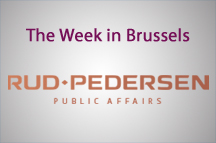 By the end of last week, Theresa May’s Florence speech was without any doubt the prime issue in Brussels. Although, by the start of this week, the fallout of Germany’s General Elections on Sunday overshadowed the Brussels bubble. On top of everything, on Tuesday President Macron made his appeal for a new Europe. In short, an exciting week!
By the end of last week, Theresa May’s Florence speech was without any doubt the prime issue in Brussels. Although, by the start of this week, the fallout of Germany’s General Elections on Sunday overshadowed the Brussels bubble. On top of everything, on Tuesday President Macron made his appeal for a new Europe. In short, an exciting week!
Florence
The long-awaited Florence speech and its actual meaning were contemplated in Brussels over the weekend. Would Mrs May make an offer to the EU on contentious issues and give new impetus to faltering talks in Brussels? Will she try to close ranks within her party with her announcement ahead of her party conference? She outlined her government’s view on future citizen rights and acknowledged the need for an “implementation period” and financial obligations.
Michèl Barnier will interpret her words and his team will decide whether significant progress has been made to move on to phase two of the talks. However, in front of cameras at No.10 Downing Street, the European Council President Tusk made already clear on Tuesday that sufficient progress had not been made. Perhaps, this latest get-together over lunch can revive the stalling divorce talks. A realistic approach from London would be greatly appreciated not only by Michèl Barnier, but also by the rest of Brussels…indeed Europe.
Berlin, or maybe Kingston, Jamaica?
 This time, it is clear to everyone, the Coalition talks will become both extremely difficult and lengthy. After the SPD experienced a catastrophic and historic defeat at the Sunday election in Germany, it finds itself without any ambition to become part of a future coalition. This brings us already to the last option: A Jamaica Coalition between CDU/CSU, FDP and the Greens.
This time, it is clear to everyone, the Coalition talks will become both extremely difficult and lengthy. After the SPD experienced a catastrophic and historic defeat at the Sunday election in Germany, it finds itself without any ambition to become part of a future coalition. This brings us already to the last option: A Jamaica Coalition between CDU/CSU, FDP and the Greens.
How these four parties find common grounds on issues like a cap on refugee numbers, a ban on coal plants by 2030 or wide-ranging Eurozone reforms is an open question. During the next months, we will probably see flexibility on party positions and a very pragmatic approach on certain policies such as digitalisation and educational reforms. Failing coalition talks would trigger re-elections. This dark outlook might enable a high degree of compromise.
One remains certain though, in-depth Eurozone reforms will not easily happen with the FDP in a coalition. Even some reluctant CDU/CSU MPs will now ally with FDP MPs on this issue. For those MPs, a Eurozone budget coupled with risk sharing exceeds their red-line.
Paris
Emmanuel Macron’s Europe speech will certainly contribute to discussions in Brussels and in the capitals of Europe. His ambitious projects to reinvent and bolster Europe did not lack any ambition. His project ranges from tax and Eurozone reforms, a common military budget and new European agencies to an overhaul of the CAP. Truly, his radical pitch aims at equipping Europe with adequate tools to cope with the increasing challenges of globalisation. However, it remains to be seen how successful he will be in convincing the capitals in Europe. Lastly, it will be crucial to what extent a German Coalition agreement will reflect his bold ideas.














